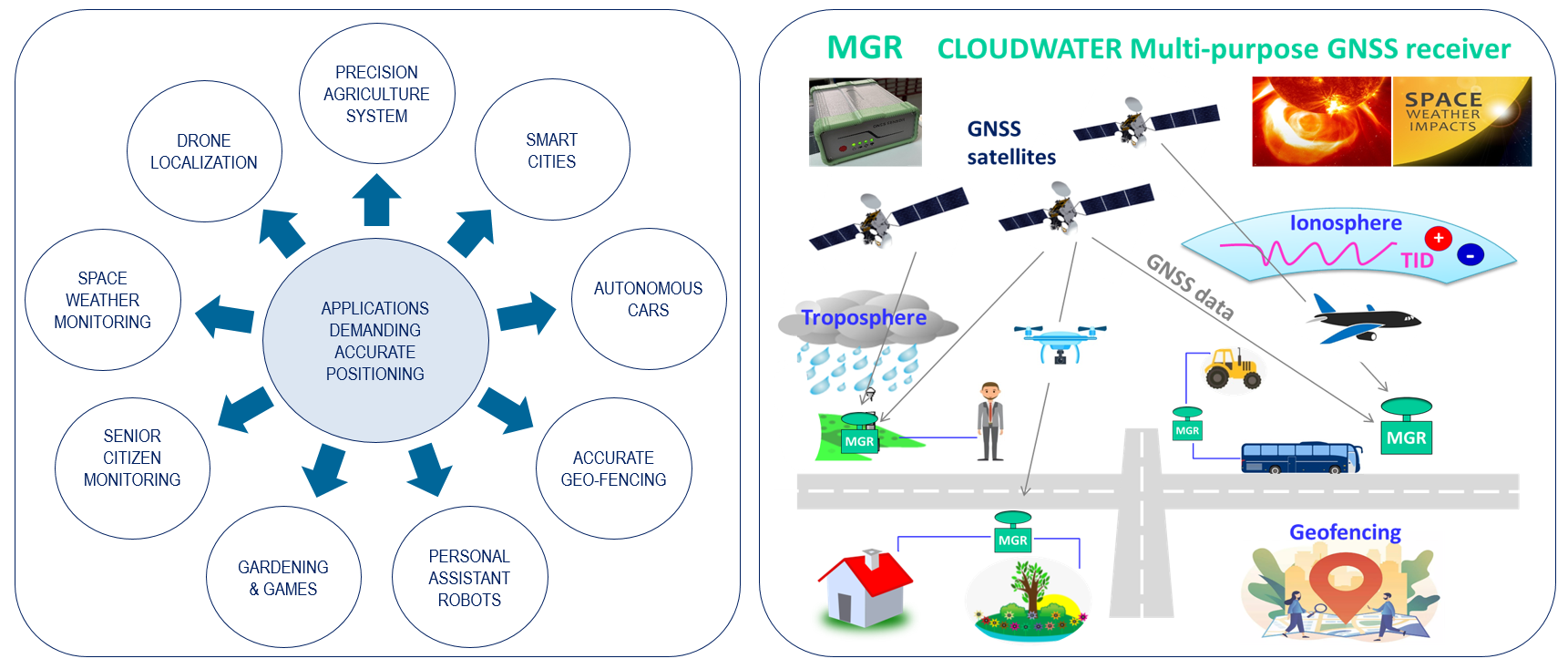CLOUDWATER Ltd is a Cypriot start-up SME that was established two years ago with the aim to develop PREcipitable WAter vapour Monitor (PREWAM), a unique and novel low-cost GNSS (GPS, GALILEO, GLONASS and BeiDou) near-real time meteorology monitor of PWV (Precipitable Water Vapor). Having successfully demonstrated this technology, after 2 years of research and development into a Minimum Viable Product (MVP), CLOUDWATER won a €170,000, European Space Agency (ESA), contract to deliver GNSS PWV estimation software components in the context of enhancing meteorological services over Cyprus. These developments encourage the transformation of the MVP (beyond its tropospheric monitoring capability) into a Multi-purpose GNSS Receiver (MGR) for exploitation at the international market in addition to associated services based on dense networks of these low-cost devices. In particular, CLOUDWATER aspires to promote MGR as an advanced low-cost solution that can be deployed in dense networks to serve atmospheric monitoring (both tropospheric and ionospheric) and to meet the needs of other scientific and commercial technology sectors relevant to accurate positioning applications such as Real-Time Kinematic (RTK) capabilities, as shown in the following figure, and provide services based on real-time data streams from these dense MGR networks.
The proposed project (MGR) focuses on further development of the existing MVP from its current TRL 5 to a TRL 7 that will eventually enable rapid market uptake, commercialization and business development of a low-cost network solution that will support atmospheric monitoring at a high temporal and spatial resolution and an array of applications and services in the near future able to disrupt the high-end geodetic GNSS receiver market in less than three (3) years from development. CLOUDWATER will utilize low-cost dual-frequency GNSS technology and rapid-prototyping and develop its TRL 5 MVP into an affordable (≈€1,200/unit) Multi-purpose GNSS Receiver (MGR) at TRL 7 to approach a final end-product that will penetrate the regional and global market as a viable alternative to support GNSS infrastructure typically based on High-end GNSS receivers typically at a cost > €5,000/unit (the cost of which is still prohibitive to support applications based on very dense networks). It is extremely important that in this effort, major research institutes both in Europe and Asia as well as Africa have declared (through letters of interest in pages 24-25 ) their readiness to incorporate MGR networks to their infrastructures based on their commercial and scientific mission for atmospheric monitoring and RTK. By bringing MGR to the market either as a standalone device but also in the framework of a network solution, CLOUDWATER aims to increase its revenue and profit, while at the same generating 1 new job position in an effort to expand. MGR general objectives are fully compatible with the objectives of the program and the call since it will:
- Support further development of the new innovative and dynamic Cypriot SME CLOUDWATER
- Support the development and international commercial uptake of a competitive product (MGR) by a Cypriot SME
- Built on innovative technologies matured at TRL 5 to develop a product at TRL 7 targeting the disruption of a high-end GNSS receiver market
- Focus on the S3Cy strategic priority sectors that can benefit from improved atmospheric monitoring and improved positioning accuracy such as Climate change, Agriculture, Transport-Shipping, Tourism and ICT as defined in the S3CY innovation strategy plan
- Further develop the technical and commercial feasibility of the product and define appropriate business models
- Prepare a business plan for exploiting the technologies at the international market
- Open 1 new position for a young (and not only) Cypriot engineer and contribute to the Cyprus economy
- Support the operational framework of the Cypriot RTDI system by establishing strong collaboration between Cypriot SMEs and research organisations having the strong support of major potential international customers
- Produce significant added value resulting from innovative technologies through R&D activities (by submitting a patent).
- MGR complies with the main objective of strategic pillar 4 of the Cyprus Research and Innovation Strategy Framework 2019-2023 – “Innovate Cyprus” to strengthen linkages and collaboration among universities, research institutes, enterprises and the public sector for cross-fertilization of knowledge, research excellence and effective technology transfer. The scope of the proposal also matches very well several topics of the S3CY, which encourages research priorities to address the security, vulnerability and robustness of wireless and satellite communication and navigation systems. It also coincides with the Cyprus Space Strategy 2022-2027 with a primary focus to become a full ESA member state in the near future. By bringing together highly-specialized atmospheric physics, GNSS geodesy scientists, the project aims at developing a Multi-purpose GNSS Receiver (MGR) for atmospheric monitoring based on existing algorithms that have been developed, applied and tested in the frames of other prototype services, and studies and therefore have been scrutinized in terms of their technical viability in a scientific and preliminary operational context.
Project structure
The project consists of 4 working packages:
WP 1: Project Management
WP 2: Dissemination and Exploitation Activities
WP 3: Technical Adjustments and Product Validation
WP 4: Market Uptake

